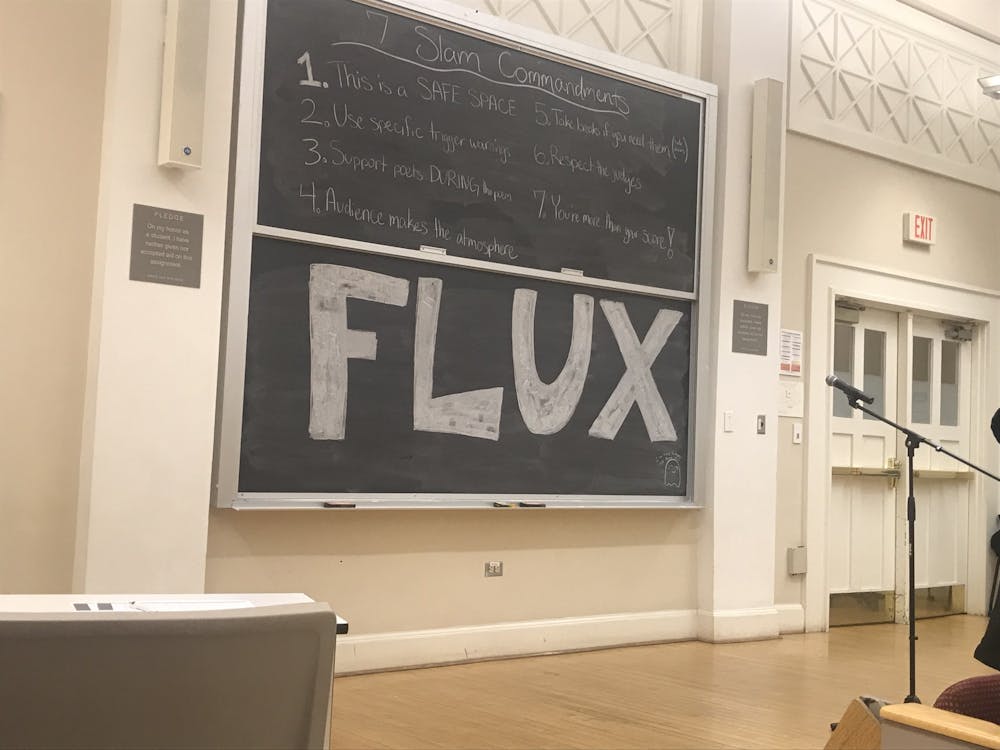Flux, the University’s only slam poetry group, hosted a poetry slam Friday night in Minor Hall as one of three qualifiers to help determine which poets will represent the University at the College Unions Poetry Slam Invitational. CUPSI is an annual poetry competition in which over 60 colleges and universities in the United States and Canada compete every year. The competition was founded in 2001 and is put on by the Association of College Unions International. Nine poets competed for five spots on this year’s team.
CUPSI will take place at Virginia Commonwealth University in Richmond next year from April 15 to April 18. Friday’s slam marked the second qualifier in which prospective team members compete. The first qualifier took place Oct. 11, and the final qualifier will take place later this semester. Poets who advance past the qualifiers will compete in the Grand Slam. This will be the fourth consecutive year that a University-affiliated team has entered the competition.
“Scores are going to determine actually who goes to the Grand Slam at the end of the semester,” said Charlie Trochlil, Flux president and third-year Commerce student. “And the Grand Slam determines who's on U.Va.’s CUPSI team.”
The evening’s slam consisted of two rounds with each poet reading one original poem each round. Some poets memorized their poems, but most read theirs off of a phone or a sheet of paper. The competition was open to students of all years. Before each round, a “sacrificial poet,” who is another student poet but is not part of the competition, read a poem to allow the judges to adjust their scoring before rating any poems from that round’s participants. That way the judges could compare scores to one another and prepare to judge another round.
There were five judges who were random audience members and ideally did not have any connection to slam poetry or the Flux organization in order to make sure that the competition was not biased. The judges rated each poem out of 10. The highest and lowest scores were dropped, leaving the middle three scores to be added up and used for final score calculation. The event brought in a considerable crowd with around 60 audience members.
“There's no theme … or writing requirement,” Trochlil said. “It's truly anything someone wants to get up and do. Sometimes you'll see people get up and freestyle, sometimes it feels much more sort of rap-reminiscent and sometimes it's just totally free verse. There is really a really broad range of styles, which is one of the things I love so much about it.”
An important part of the dynamic in a poetry slam is audience engagement. Members of the audience were encouraged to snap, clap and cheer throughout the poets’ readings.
“The atmosphere is just incredible,” said Olivia Keenan, first-year College student and one of the participants in the slam. “It's one thing to write a poem ... but it's another thing to perform it for people that are like an incredible community … snapping and cheering.”
Friday’s slam featured poetry on a variety of different topics such as mental health issues, romance, heartbreak, racism, friendship and family relations. Since some poems discussed sensitive issues, poets were asked to say “trigger warning” and specify their potentially sensitive topic before beginning their reading.
“I thought it was really cool that a lot of people brought really personal poems, and I thought it was really cool how open everyone was about their stories,” said Sarah Mackey, a first-year College student and audience member.
Despite the supportive audience, students noted that there can be some nerves that come along with sharing such personal poems.
“I think you are really vulnerable, and you allow yourself to be vulnerable on stage,” Keenan said. “And so I think that that's frightening. But once again, it's easy to not be scared anymore when everyone is like, so there for you in the moment.”
Trochlil was the highest-scoring poet of the night, so he will automatically advance to the Grand Slam. Other than scoring the highest in a qualifier, poets can advance to the Grand Slam in one of two ways. They can compete in at least two of the three qualifiers — the choice of which two qualifiers is up to them. Poets could also advance by being one of the five to seven poets with the highest total scores at the end of the three qualifiers.
The next and final qualifier will take place Nov. 22 at 7 p.m. in Minor Hall 125. Those who advance past the qualifiers will participate in the Grand Slam. The final CUPSI team will be determined at the Grand Slam, which will take place Dec. 6 at 7 p.m.







